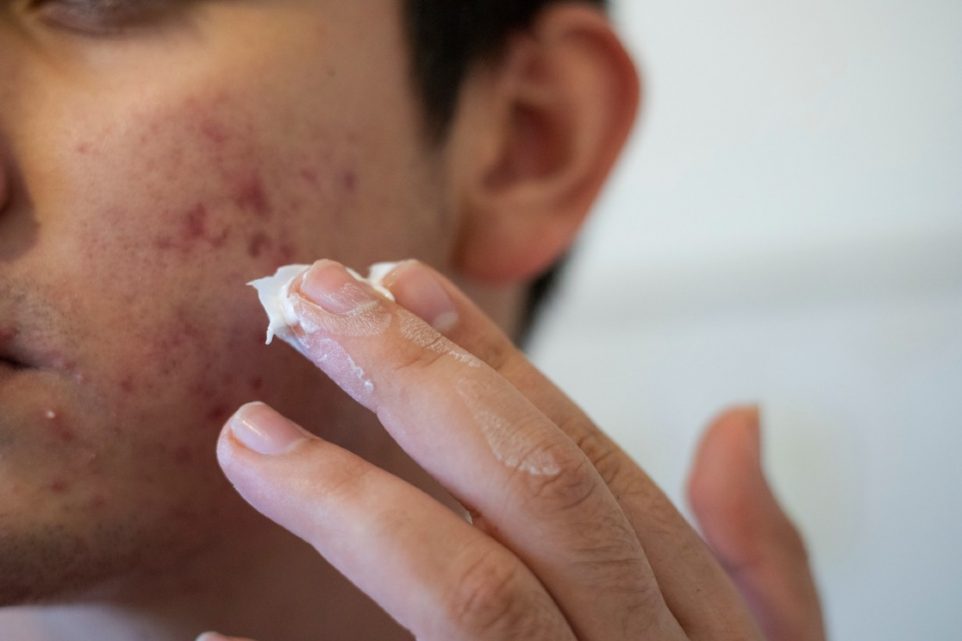Understanding Acne: Does Creatine Cause Acne?

Acne, a common skin condition that affects people of all ages, often leaves those who suffer from it seeking answers about potential triggers. Among the various factors that can contribute to acne, questions have arisen about whether creatine, a popular dietary supplement among athletes and fitness enthusiasts, could be linked to breakouts. In this comprehensive guide, we’ll delve into the world of acne and creatine, exploring the science behind this potential association, and providing valuable insights to help you make informed decisions. If you are thinking about using creatine or already do, read on to find out if it’s causing you acne.
Acne Unveiled
Before we tackle the creatine-acne connection, it’s crucial to understand the underlying causes of acne. Acne develops when hair follicles become clogged with oil (sebum) and dead skin cells. This environment provides an ideal breeding ground for the proliferation of Propionibacterium acnes (P. acnes) bacteria, leading to inflammation and the formation of pimples, blackheads, and whiteheads.
The Role of Diet in Acne
High-Glycemic Foods
The relationship between diet and acne has been a subject of study and debate for decades. While diet alone may not be the sole cause of acne, certain dietary factors can influence its severity. Foods with a high glycemic index, such as sugary snacks and processed carbohydrates, can cause spikes in blood sugar levels, leading to increased insulin production. Elevated insulin levels may trigger the sebaceous glands to produce more oil, potentially exacerbating acne.
Dairy Products
Some studies have suggested that dairy consumption, particularly skim milk, may be associated with an increased risk of acne. The exact mechanisms behind this association are not fully understood but may be related to hormones present in dairy products.
Omega-6 Fatty Acids
A diet high in omega-6 fatty acids, found in many processed and fried foods, can promote inflammation in the body, which may contribute to acne.
Creatine: What Is It?
Creatine is a naturally occurring compound found in small amounts in certain foods and synthesized by the body. It plays a vital role in energy production, particularly during short bursts of intense physical activity. As a popular dietary supplement, creatine is often consumed to enhance athletic performance and increase muscle mass.
The Creatine-Acne Connection
Dehydration
The potential link between creatine and acne is not entirely straightforward, and scientific studies have produced mixed results. Creatine can cause the body to retain water, potentially leading to dehydration if not enough fluids are consumed. Dehydrated skin may produce more oil, which can contribute to acne. Therefore, it’s essential to stay adequately hydrated when taking creatine supplements.
Hormonal Effects
Some individuals may experience hormonal fluctuations when using creatine, potentially influencing sebum production and skin health. However, these effects can vary from person to person.
Quality of Creatine Supplements
The purity and quality of creatine supplements can vary among brands. Choosing a reputable and high-quality product can reduce the risk of potential side effects.
Individual Sensitivity
Like many dietary supplements, individual responses to creatine can vary widely. Some people may experience no skin issues, while others may notice changes in their complexion.
Maintaining Clear Skin While Using Creatine
If you’re considering or currently using creatine supplements and wish to preserve clear skin, here are some important tips to follow. First, prioritize hydration to counteract potential dehydration effects. Establish a consistent skincare routine encompassing gentle cleansing, exfoliation, and the use of non-comedogenic, oil-free moisturizers. Additionally, maintain a balanced diet rich in fruits, vegetables, and whole grains while minimizing high-glycemic and processed foods. Lastly, if you encounter acne breakouts or skin changes while using creatine, consult a dermatologist for personalized guidance and potential treatment options. These steps can help you maintain healthy, blemish-free skin while incorporating creatine into your regimen.
In Conclusion
The relationship between creatine and acne is complex and not universally applicable. While some individuals may experience skin changes when using creatine supplements, others may not notice any adverse effects. If you’re concerned about the potential impact of creatine on your skin, consider implementing the tips mentioned above and consult a healthcare professional or dermatologist for personalized advice. Ultimately, the decision to use creatine should be based on your individual fitness goals and health considerations.